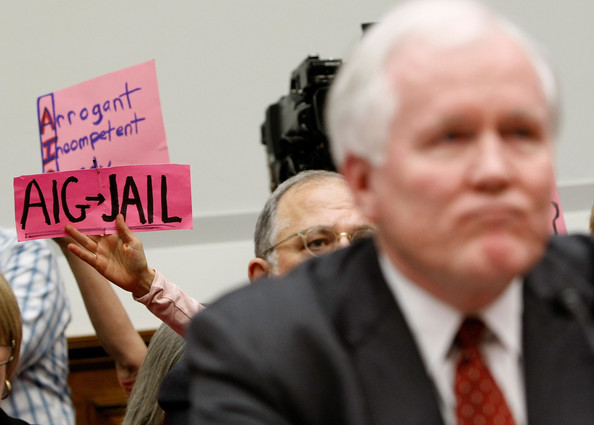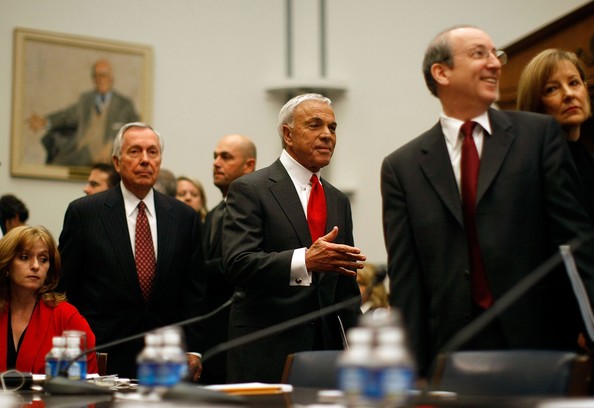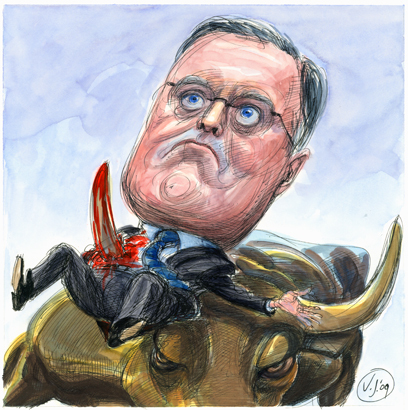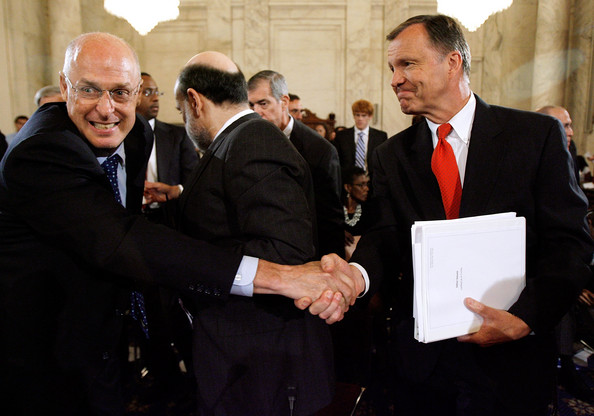SNL Bailout Comedy: Tim Geithner Discusses The Bank Stress Tests
Geithner on the bank stress tests.
Robin and Barry Gibb (Justin Timberlake and Jimmy Fallon) discuss the economy with Nancy Pelosi and Nouriel Roubini.
Geithner on the bank stress tests.
Robin and Barry Gibb (Justin Timberlake and Jimmy Fallon) discuss the economy with Nancy Pelosi and Nouriel Roubini.

Former Assistant Treasury Secretary and head of the Troubled Asset Relief Program (TARP) under Paulson, Neel Kashkari made a recent appearance on the Charlie Rose Show. It's an excellent discussion and summary of the financial crisis as it has unfolded over the past 18 months.
Personally, Kashkari comes across as sincere, honest and intelligent. I don't agree with some of his bailout views, but I respect that men and women of his intelligence and dedication sacrifice higher pay in favor of civil service and the greater good. Obviously, a difficulty can arise, or appear to, when there is a revolving door between public-and-private sector employment with respect to an industry that is receiving trillions in government aid.
While Kashkari migrated to Treasury from Goldman Sachs and will likely return now that he has completed his tenure in Washington, it's not credible to believe it was a part of some sinister plot. When Kashkari left GS in 2006 it was not clear to most observers (including GS execs) that a financial crisis of centurion proportions lay ahead. I believe he simply wanted the challenge. He's not an elitist by any stretch of a Goldman standard. Undergrad at the University of Illinois in engineering and then several years with an aerospace company before joining GS in San Fran.
Accordingly, I'll leave it to others to judge him. He'll be okay with us as long as we don't hear he had anything to do with AIG CDS payouts at par. That decision is kryptonite.
Clips are after the loop.
| The Daily Show With Jon Stewart | M - Th 11p / 10c | |||
| Intro - Bailout Acronyms | ||||
| thedailyshow.com | ||||
|
||||
Harvard Law professor and jefe of the Congressional Oversight Panel for TARP, Dr. Elizabeth Warren made a recent apperance on the Daily Show with Jon Stewart. This is good stuff.
In the above clip regarding bailout acronyms, Jon wonders if TARP will get money from ANUS. (The agency for nullifying undervalued securities?). The Warren clips are after the jump.
Eric Dinallo is the primary state regulator of AIG as Superintendent of the New York State Insurance Department. He's a lawyer who worked for New York AG Eliot Spitzer from '99 to '03 and Morgan Stanley from '03 to '06 so his hands are not completely clean. Not to mention that he had the opportunity to step in at AIGFP in 2007 and did not. Nice.
Therefore, of course, here in bailout Wonderland with Alice trolling about somewhere in Washington, Dinallo still has his job and his word is gold.
Sue Herrera and Bill Griffeth with Dinallo.

California Republican Darrell Issa is definitely one of the good guys. At a minimum, he provides a non-partisan and reasonable voice on financial and bailout issues. He along with Brad Sherman, Alan Grayson, Mike Capuano, and Ron Paul have been outstanding stewards and deserve special mention regardless of politics.
Issa is a co-sponsor of the House version of the already-passed Senate bill to create an independent commission to study the financial crisis. As of this moment, the House has still not taken up the measure for vote though it is widely expected to pass once the details are administered. The discussion at this point is whether to make it fair, with 5 members appointed by each party, or whether Pelosi will politicize the process by giving Democrats more appointed seats on the commission.
Stuart Varney of FBN interviewed Rep. Issa Wednesday and the discussion moves from the details of the financial commission to the future bailouts of Social Security and Medicare. Issa even calls Social Secuirty a Ponzi, which, though unmistakably true, is a mildly surprising public admission from a pol. For a quick refresher on our unfunded entitlement liabilities, the Peterson Foundation now calculates that future obligations for Medicare and Social Security have surpassed $40 trillion and are growing at approximately $2.5 TRILLION per year. And just to be clear for readers, that's $40 trillion worth of future promises with exactly $0 set aside for payment.
The short interview is after the jump.

Yesterday AIG CEO Ed Liddy made another well-rehearsed trek to Capitol Hill to deliver his face for Congressional dart games. The faux anger and populism was palpable even to the least cynical of viewers. The upshot was none too satisfying: AIG expects (hopes, dreams, prays) to reimburse the taxpayer fully within 3-5 years provided the economy doesn't weaken further. (Good luck with that small caveat.) The tally, last checked, was $182 billion from taxpayers out the door and exactly zilch having been returned thus far. Optimism still trades at a substantial premium to reality inside AIG.
Let's have a quick look at AIG's track record with forcasting and very slight penchant for optimism. In December of 2007, Joseph Cassano said it was difficult to imagine any scenario under which AIG would lose even 1 dollar on its CDS obligations. Nine short months later in September of '08, AIG said it needed $20 billion in capital to stave off bankruptcy. The next day Paulson and Treasury announced a $75 billion bailout of AIG to be re-paid within 12 months. Now 8 months and 3 iterations later, we are told the current $182 billion bailout might be re-paid in 3-5 years, IF the economy does not weaken substantially from here.
My question is simple: do they put Zoloft and Ecstasy in the food at AIG headquarters or do certain execs just use needles.
After the jump, we have video of Liddy's opening statement, the transcript, an Ohio-focused attack from Kucinich and a few related stories.
See also:

We'll have some commentary on this story later, but for now enjoy the video update from Armen Keteyian of CBS.
 Florida attorney general, Bill McCollum has brought civil charges against former Countrywide CEO Angelo Mozilo for deceptive and unfair trade practices. McCollum charges that Countrywide and Mozilo put thousands of borrowers into fraudulent mortgages. Countrywide had a massive footprint in Florida mortgage origination at the height of the insanity and former Congressman McCollum is essentially suing Mozilo personally for the fraud of the entire company. Nice.
Florida attorney general, Bill McCollum has brought civil charges against former Countrywide CEO Angelo Mozilo for deceptive and unfair trade practices. McCollum charges that Countrywide and Mozilo put thousands of borrowers into fraudulent mortgages. Countrywide had a massive footprint in Florida mortgage origination at the height of the insanity and former Congressman McCollum is essentially suing Mozilo personally for the fraud of the entire company. Nice.
The news is that the federal court judge has remanded the case back to the state courts of Florida which is exactly what McCollum's office requested. He's looking for a large cash settlement and a ton of publicity, he probably wants to be Governor.
The clip is David Faber with Florida AG Bill McCollum (7:03).
Former UK central banker and current professor at the London School of Economics, William Buiter, was an interview guest of David Faber this morning. Clip runs approximately 7 minutes.
l
A new reality for the smart-ass AIG kids from Jimmy Kimmel Live.
See also:
Original Collection of AIG Kid Commercials
Tip to Nicholas Carlson from Clusterstock:
CNBC had Dan Solin, the author of The Smartest 401k Book You'll Ever Read on as a guest today. After the host asked him what people could do better to save for retirement, Solin answered:
"One of the things that you could do is to give us more 'In Bogle we Trust' and much less 'In Cramer we Trust'."
Moments later, Cramer barged on to the set to respond.
"The S&P is flat literally for ten years. That's John Bogle's world. If you were to sell at 11,000 like I told you in September, 10,000 like I told you in December, and then get back in at 6,500, who wins? Is that so bad? Is that worth not trusting in? I've had it with the people who tell me about the index fund. For ten years they've done nothing! For ten years! When do they get called on the carpet? When are they ever wrong? Do we have to wait another ten years? Enough of this! I've said my piece. Happy 20th!"
Lawrence Summers asleep at the wheel during a White House meeting with credit-card providers.
Ms. Tavakoli found our site recently and contacted me about Elizabeth Warren. We decided to present one of Janet's recent media appearances. It's a rather long clip but quite interesting nonetheless. It's from an April 19th interview on C-Span with Brian Lamb.
Janet Tavakoli is founder and president of Tavakoli Structured Finance, a Chicago-based firm that provides consulting to financial institutions and institutional investors. . Her new book is called "Dear Mr. Buffett: What an Investor Learns 1,269 Miles from Wall Street." Its the story of her meetings with Warren Buffet prior to the economic downturn and how that impacted the way she views investing. She is a former adjunct professor of derivatives at the University of Chicago's Graduate School of Business. She has also worked for Westdeutsche Landesbank in London, Bank One in Chicago, Merrill Lynch, PaineWebber, and Bear Stearns.
Updated on Apr 24, 2009 at 5:31 PM by
 DailyBail
DailyBail

Damned If They Do, Damned If They Don't...
The process of conducting economic stress tests on the 19 largest US banks enters a crucial phase Friday: regulators will begin to share their conclusions with bank executives, and there will be the first public disclosure of the specific criteria utilized in the determination of the health of the individual institutions.
That's the meat. How rigorous were the modeling assumptions for economic deterioration? It has leaked that the worst-case scenario for unemployment for '09 used in the tests has already been surpassed. The assumptions are the story tomorrow.
In the short CNBC clip, Laurel and Hardy, Santelli and Liesman have a decent discussion about pitfalls, tightropes, and landmines associated with the much ballyhooed tests.
Updated: the test assumptions have been released. Just as we surmised, the criteria are not especially stringent, in some cases they have already been met or surpassed by the worsening economy since the tests were launched. Read Yves Smith's thoughts as well as those of Calculated Risk for a through understanding and honest assessment of the information released yesterday from the Fed.

Pretty solid CNBC video discussing Ken Lewis, Henry Paulson and the Bank of America takeover of Merrill Lynch. They pose the question: who's the bad guy?
Ken Lewis is guilty of having the most-hated face in all of failed banking. He should be indicted for ugly. And for insulting my intelligence everytime he's on TV. His purchases of Countrywide and Merrill Lynch, both at substantal premiums, makes him the stupidest CEO in recent memory.
Paulson is guilty of leading the effort to have the SEC grant Wall Street an exemption to the leverage cap in 2004. Paulson is also the most likely to trash your house, screw your wife and steal your job while you are on vacation. Ask Corzine.
Bernanke is guilty of turning the Fed's balance sheet into a cesspool. Bloomberg and Mark Pittman reported today that the Fed will still NOT release details on the more than $2 trillion in loans it has made to the various and sundry.
And all three are guilty of not anticipating the global financial crisis. Once it began to show itself in 2007, each miscalculated the severity. Contained. Sub-prime only. Move along. Nothing to see here.
Hey geniuses, when a condo in Santa Monica goes from $300k in 2000 to $1.1M in 2006, then we are gonna have banks with problems. Capisce, you friggin' idiots.
Let's see what you got.

I remember the weekend in question last September very clearly. Fannie and Freddie had failed. AIG was teetering. A meeting was called, ostensibly to find a buyer for Lehman Brothers (Barclays ultimately balked at the absence of Fed assistance-sharp Brits!), but the surprise was Ken Lewis hooking up with John Thain, and Bank of America buying the tangled morass that was Merrill Lynch.
BAC paid a huge premium for Merrill and that outrage notwithstanding, the purchase itself was the most idiotic in the banking space since Wachovia gorged on Golden West Financial at the peak of the bubble in May 2006. Every soul on the street outside of Bill Miller knew Lewis overpaid and that Merrill's balance sheet was a radioactive nightmare. The criticism was so uniform in the days that followed that we assumed that it had to have been an 'encouraged marriage.' Lewis couldn't be so dense as to believe he struck a good deal.
I think the jury is still out on whether Lewis was prodded to do the deal, or even whether he was offered future assistance from the FedTreas if he agreed to take on Merrill's liabilities. Regardless, Lewis still overshot massively. Granting a premium for Merrill at the time was a low point in bank deal-making history, and offered a hint that he had lost his mind. He and his board should not be approved by shareholders when they vote next month.
And then there was today. A day of rare, exquisite joy as the 'he-said, he-said, he-said' romp around the Cuomo subpoena was played out before millions of smiling viewers. Cuomo, Lewis, Bernanke and Paulson. It couldn't get any better for payback junkies. But then it did. There were rebuttals, contradictions, restatements, and denials. It was a good day for the home team, a day for laughing and smirking and feeling that maybe, just maybe, the guilty will be punished after all.
Without polling, I believe most of us desire intense social and psychological pain for one man in particular, Henry Paulson. And for once, we got what we wanted.
Here's a toast to today's circus and to the dream that Bernanke is not re-appointed, that Paulson is indicted, and that Ken Lewis loses his motherfreakin' J-O-B.
Harrruuuumppphhhh.